Beater Car: The Ultimate Guide To Finding A Cheap Used Car
Inside: Learn why you may want to drive a beater car (from someone who has owned a few). Plus find tips to make sure you are getting a good deal.
Okay, let’s preface with… my dad has been in the car industry for over 40 years. So, I have grown up in dealerships, car garages, and service centers. My friends call me an expert, but I prefer to just be helpful so they don’t overpay when buying or getting repairs done.
Now, that authority is established, let me help you understand the beater car mentality.
If you are looking for a cheap used car, but don’t know where to find one, check out this guide that will help you get started.
Buying a used car can be tricky. It’s not just about finding one that is inexpensive, but also getting the right size for you and your lifestyle.
There tends to be more mystery surrounding what it’s like buying a new car from the dealership than an old one from somewhere else.
In this article, I will be shedding some light on how to find a cheap used car in your area if you are shopping for one. Also, if you are maintaining a beater car, you will find the tips to make sure your car lasts many more years.
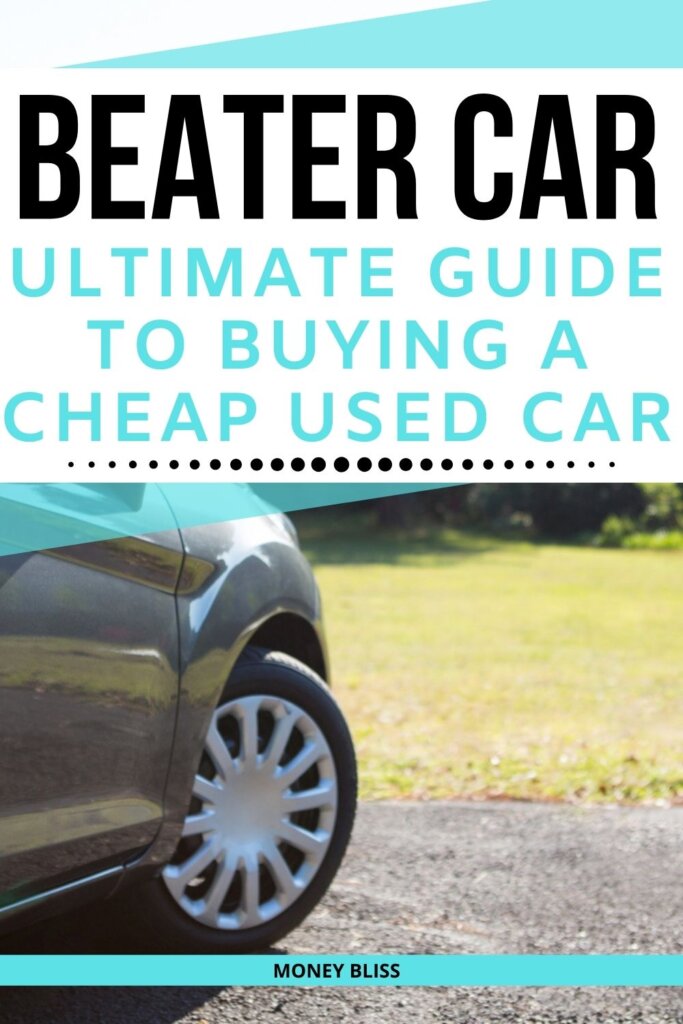
What Is a Beater Car?
A beater car is usually an older, higher-mileage vehicle that still runs and is legal to drive.
The term “beater” was coined because many of them have cosmetic damage and mismatched paint.
A beater car is rarely pretty but “gets the job” when it comes to getting you and yours from here to there.
What is the point of a beater car?

A beater car is a reliable and easy-to-fix car that is cheaper than a new car.
The point of a beater car is to save money and reduce the amount of maintenance that needs to be done on it.
It has little intrinsic value, & while not “easy on the eyes,” a beater car is generally a smart choice to wear into the ground.
There are many advantages to buying a used car, including insurance savings, tax breaks, and lower operational costs.
Beaters can also provide peace of mind because they are easier to repair if something does go wrong.
Cars and Deprecation
The main reason is that usually, they do not disclose how much of the price tag is going towards depreciation. What happens when your brand-new vehicle goes through years worth of wear and tear? It depreciates at a staggering rate and you end up with the same old car that’s only worth what is left of it.
Did you notice that keyword in the last paragraph – depreciation!
For many who are choosing to lower their costs and pursing FIRE movement, they know that a brand new car will depreciate the most within the first five years.
Driving a beater car is not a sign of being poor or reckless. You still need proper auto insurance to drive.
With this guide, you’ll find out which cars have what features and quality that will fit your needs and lifestyle. Now, let’s find a car with features that are important to get around town and save your wallet!
Should you drive beaters?
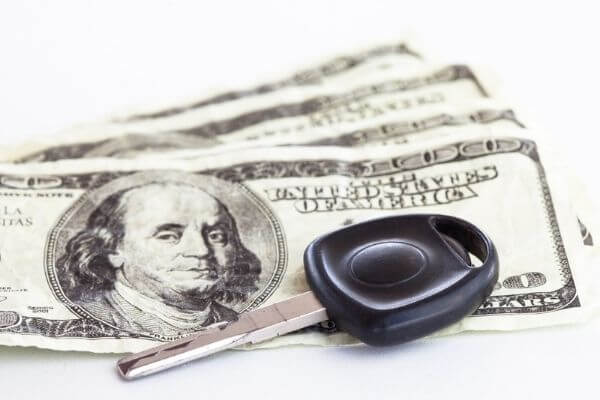
People are in different situations when they are buying cars.
The best customers for cheap cars are either first-time car buyers or people who have to save some cash to reach a financial goal they set in place.
On the other hand, if you like reliability, make income from your car, enjoy looking good, or do not know your way around a car, maybe you should skip a beaters car.
How Can You Recognize a Beater Car?
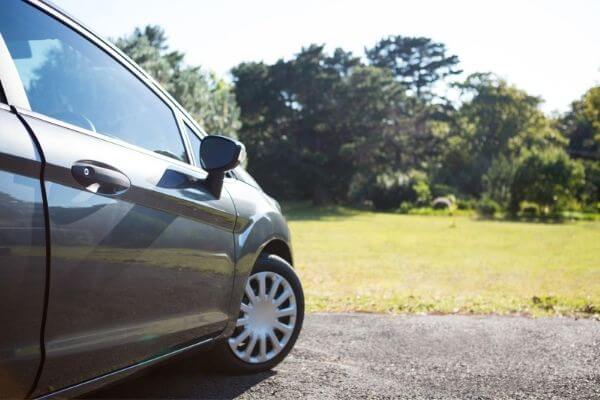
A beater car is a car that is older and cheaper than other cars in its class. It may also have high mileage or corrosion on the body. You can look for these signs to help you identify a beater car.
More than likely, they will be easy to spot. Many common ones include Honda, Toyota, and Suburu. Those are the engines that can keep on running!
Is a Beater Car Worth It?
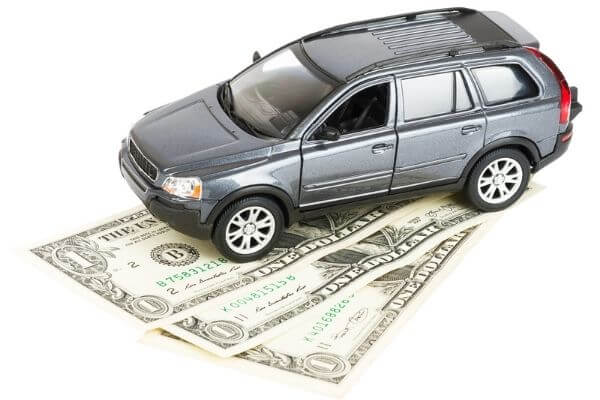
Well, there are two sides to the coin on this one. So, we will present both arguments first.
Definitely Worth It
Simply put, a beater car does not cost a lot of cash. You can find reliable and affordable beaters if you know where to look. In most cases, the best way to find a cheap used car is by checking out local classified ads or online listings.
Beater cars are a great way to save money on all sorts of fronts.
For starters, they’re cheaper to buy than most other cars. Additionally, used cars can help with taxes, insurance, and maintenance costs.
In short, a cheap car is a great way to get around while keeping your expenses low.
Um, Hello – No!
A beater car is not worth it. There are many reasons why you should not buy a beat-up vehicle. The first reason is that they are cheap, and the owner will most likely not take care of them properly. Not only will the car need repairs, but you could also have to buy a new one.
Didn’t you know that you can lease a vehicle for next-to-nothing with a low-interest rate? (p.s. don’t fall for that line. Leasing a car is the worst thing you can do financially. That is a post for another day on leasing vs buying a car.)
All in all, it depends on what you need and what you can afford at the moment. For many, the answer to this question is yes, but only if you are looking for a cheap car.
What is the price of a beater car?

A used car is a vehicle that has been previously owned, so it has depreciated in value.
The price of a beater car is difficult to determine and varies depending on the quality of the vehicle, its condition, and what it might have been used for. Typically, you can find a solid mechanical vehicle for around $5000.
You can always check against the KBB price and run the VIN to check its reported history.
Beater Car Benefits:

The benefits of a beat-up car are listed here. Many people are proud of their vehicles and proudly want to be a part of the 200k miles club.
- They include the opportunity to drive around with no maintenance, the ability to use it for parts, and the freedom from monthly payments.
- A used car is cheaper upfront than a new car.
- Cheaper on insurance. Beater cars require minimum coverage, so they’re cost-effective for monthly expenses.
- A beater car is cheaper on gas (this is true for sedans; not so much for SUVs or trucks.)
- The car will retain its value and not depreciate much more.
- The car can still be sold for what was paid for it, as long as it is in the same condition.
Now, let’s dive a little deeper into each of these.
#1. Cheap Price
One reason to prefer a cheap car is because of the low price point.
For the first time ever, the price of a new car tops $47000 – an all-time high.1 That is a whole lot of money especially when it loses most of its premium in the five years.
Driving a beater may not feel as luxurious as driving a newer car, but the cheap price point lets you save money.
#2. No Car Payments
There are many benefits to not having car payments.
One of the most obvious is that you save money. In addition, not having car payments can also reduce stress and anxiety levels, because you’re not as tied down to a monthly payment.
It is not normal to have a car payment your whole life. That lifestyle will cost you a fortune with lifestyle creep.
#3. Cheaper Gas
Old and beaten-down cars that don’t require premium fuel will be heaven for your wallet, saving you hundreds, maybe even thousands of dollars per year.
Gas prices vary throughout the day, so drivers should plan their trips around the cheapest prices. In addition, using a cheap car can save you money on gas in the long run.
#4. Cheaper Parts

First of all, you need to find a reliable mechanic or be able to do some of the work by yourself.
In addition to being cheaper, older car parts are also easier to find. Car parts are still available from common car manufacturers, so you don’t have to go through a premium supplier to get what you need.
Additionally, the older vehicles do not have the fancy chips like the newer cars which make the cost of parts increase and the difficulty of getting those types of parts.
#5. Minimum Insurance Coverage
Buying a used car saves money on car insurance.
You only need to meet the minimum insurance requirements of your state, and you don’t have to worry about finance companies taking out full coverage collision and comprehensive insurance.
However, you may want comprehensive coverage if the cost is minimal compared to replacing the car. For instance, if you pay an additional $50 per year for full comprehensive coverage that will give you the $5k worth of your car back if something happens. That may be worth the extra cost.
Plus driving a car with a lower resale value can help save on vehicle taxes.
#6. Less Depreciation
Older cars have already depreciated in value over the years, so they aren’t going to lose much more during the period of your ownership.
Plus if the engine gives out, you can always sell it for scraps and parts at the local junkyard. That will help you recoup costs for another one.
Remember, you wipe away value from your brand new car once you drive off the dealer’s lot.2 This is a hot debate on whether your car is an asset or liability.
#7. More Freedom
When you are not bogged down by variable expenses of maintaining a high-value car, you have more freedom.
This is more freedom in your budget and more time freedom as you don’t have to work hard to pay for your mode of transportation.
Think about it… if you invested $500 a month for seven years at the average rate of return of 8%, you would have accumulated $55,000. Compounding interest will do amazing things for your net worth.
Beater Car Downsides:
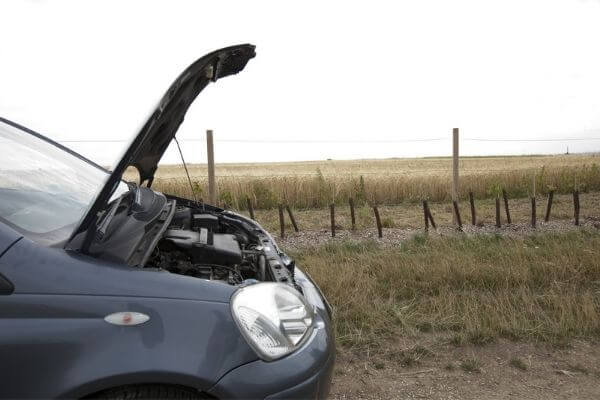
Saving money is the biggest benefit of buying a used car.
- Beater cars are potentially less safe than modern cars.
- Long-distance car rides might not be possible with a cheap car
- Downsides to having a good beater car include the possibility of breaking down and being far away from home if needed.
- Possible more maintenance.
- There is more risk. You don’t want to gamble.
#1. Less Safety
Cars from before the 2000s don’t have the same crashworthiness as newer cars.
This is a factor that you cannot deny and a serious factor when considering your purchase.
In a collision, they are more likely to sustain damage and injure the passengers inside.
#2. Low Probability of Longer Trips
These are great for commuting around town and getting you to and from.
However, there is a low probability you want to use them on longer trips.
Given there are many things that could go wrong, you don’t want to break down far from home or even a nearby city where you can get repairs done.
You don’t anticipate needing to take this car on long trips in the near future because there is a low probability of needing to take it on longer trips. This is due, in part, to the fact that it doesn’t have great gas mileage and you don’t think you’ll need to use it for long distances.
#3 – Higher Maintancence Costs
You always need a sinking fund for repairs when you own a beater. Period.
You are one drive away from something going out and needing to be repaired.
Also, you need to find a quality mechanic that thrives on keeping older ones running without nickel and diming you along the way.
You cannot use a dealership service center to maintain your baby.
Which Are the Best Beater Cars?

The best beater cars are cars that are cheap, have low mileage, and are easy to repair. The cars are great to use as a daily driver, but they are not ideal for long distances.
Cheap cars can be a good option for car buyers on a tight budget or for young drivers.
There are many reasons to consider buying a used car over a new car, but the decision ultimately depends on the buyer’s needs and preferences
What are some good beater cars?
These reliable beater cars can be a great way to save money on car buying.
Some of the better cars to choose from that would make for a great beater include Toyota Corolla, Honda Accord, and Honda Civic.
They are old, but still in pretty decent shape. All in all, you want to look for one that is very well-maintained and highly cared for. The ones sitting in your grandparent’s garages were hardly driven and immaculately maintained.
What to Check Before Buying a Beater Car

The best way to ensure that you’re buying a good quality car is to do some research and make sure you know your facts.
All dealers are not created equal, so it’s important to check out what other people are saying about the dealer. Also, make sure that the car you’re buying is in good condition and has a clean title.
Many times, a beater is a car that is used to transport things such as furniture, trees, etc. Sometimes they are usually not very well maintained and maybe not very well cared for.
However, a used car can still be a good car for someone who is looking for a cheap car and does not care about the condition of the car.
Specifics to Look For:
- Low mileage
- Consider the brand/model
- Fuel economy
- Exterior and interior condition
- Tire condition – specifically have the tires been patched or worn?
- Reliability
- Maintenance history
- Number of owners
- Number of accidents
- Anything rebuilt like the engine
For example, one of the Toyota Corollas I owed was older but had a new engine installed. Thus, the value of the Corolla was higher as the engine had minimal miles on it.
In fact, here is a picture of it… doesn’t look like a junker right?!?!
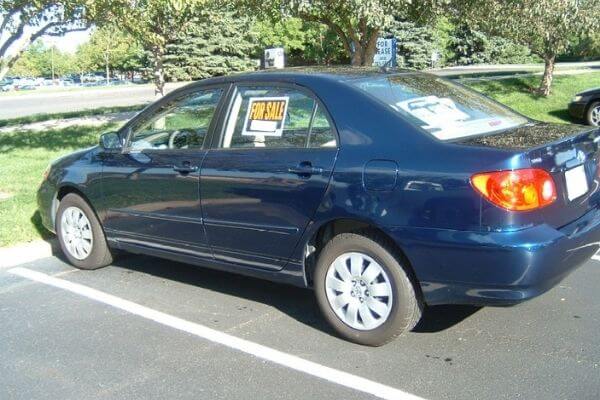
Questions to Ask Yourself:
Before buying a used car, you should check the following:
- Is it in good shape?
- On the engine, is it manual or automatic?
- Is it the right size for your needs?
- Does it have enough power?
- Does it have enough room?
- Is it reliable?
- Is it comfortable?
- Easy to drive?
- Is it safe?
How to Buy a Beater Car

When buying a beater car, you should check the following things:
1. Finding One to Buy
Many times, this will be the hardest part. Sometimes, the easiest if someone needs to get rid of one quickly.
Try buying a beater car from friends or family.
The next place to check is your mechanic. Remember, they are your best friends in this process and always know the movement of these types of cars.
Also, you can check online – Facebook Marketplace, NextDoor and Craigslist are great options but follow your instincts.
Lastly, you can try a local dealership. However, be very careful as you don’t want to be scammed or pay more than the car is worth.
2. Check the VIN Number
VIN stands for Vehicle Identification Number. A VIN is a serial number that identifies the make, model, and vehicle type of a motor vehicle.
The VIN number is a unique identifier for a car that can be used to learn about the car’s history and identity. The number is usually 17 characters long and contains both numbers and letters. It can be found on the dashboard, driver’s side door, or engine of the car.
More importantly, it can be used to learn about the car’s history and identity, including its make, model, year of manufacture, and more. Even if the car was stolen.
3. Look at Mileage
Beaters usually have high mileage, but how high is too high?
Do your research for what could be a red flag. Look up how the specific make and model you’re considering holds up in high mileage.
In this regard, lower is better, although beaters will generally have higher mileage than a newer used car. Look for beaters with 80,000 to 150,000 miles on the odometer, but don’t go over 150k miles. You want to drive it into the 200k mile club, right?
4. Run the Auto History Report

You want detailed information on a car’s history, including maintenance and repair records. This can help determine whether or not a car has been well taken care of. If a car has had many owners in a short period of time, it may be an indication that the car was neglected.
The VIN number (vehicle identification number) helps you obtain a vehicle history report by running through a service, like CARFAX. Companies like VINCheck.info and AutoCheck provide vehicle history information, too.
A good indication that a car may have been neglected or doesn’t run well is the fact that it has had many owners in a short period of time.
5. Checked by Your Own Mechanic
If you haven’t figured it out by now, a trusted mechanic is a must!
Before agreeing to the purchase, you must have the vehicle independently audited by your own mechanic. This may come at a small cost, but it is better to know the condition of the mechanical systems before you purchase.
Also, your mechanic can tell you what you should pay for it as well as any outstanding repairs or maintenance that needs to be done.
6. Passed State Inspection
When buying a car, it must pass state inspection. If it doesn’t, you may end up spending more cash on repairs and/or fines.
You can ask for the last inspection report. If it has been more than a year, it is worth testing it again.
In any case, you don’t want to buy a car only to have it break down on you soon after.
7. Take it for a Test Drive
When you’re looking to buy a used car, you must take it for a test drive. This allows you to listen to any loud noises and also gives you a chance to feel the car out.
If something doesn’t feel right, then it’s probably not the right car for you.
When you’re looking to buy a used car, the seller must allow you to take the car to a mechanic for a test drive. If they don’t, it’s probably because they’re trying to hide something and it’s best to move on.m
Fixing a Beater Car:
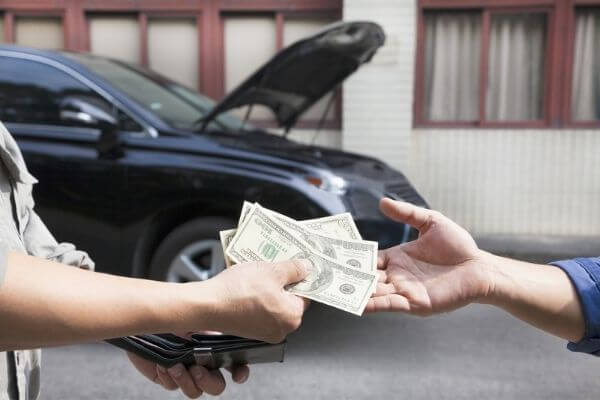
The best option for fixing a beater car is always to do the repair yourself. This will save your finances and allow you to learn more about how your car works. There are a variety of resources available online that can help you with this process, including videos, articles, and forums.
If you find a car with engine problems, you will need to consult a mechanic. The problem may be something simple that is quick fixes with a tune-up, or it may be more serious.
If the cost of repairing a used car is almost as much as what you paid for the car, then it may be time to move on.
Selling a Beater Car:

The process is very similar to buying it except now you are the seller!
The same places you would look for one would be the same places you would sell it – friends, NextDoor, Craigslist, mechanic, or Facebook Marketplace.
You might even be able to get some cash for your beater car by trading it in at a dealership. The dealership will likely give you less than if you had sold the car to a private party, but it’s better than nothing. However, some dealerships have pretty awesome trade-in policies to get you in a new and more expensive ride!
Reasons NOT to Buy a Beater Car

The most common reasons not to buy a used car are that they are very expensive to fix, impractical in terms of fuel efficiency, and require more time and effort than expected.
However, those of us who have owned older sedans, SUVs, or trucks know the significant savings associated with it and get many weird looks from others.
Top 10 Reasons NOT to Buy a Beater Car:
- You want/need a good-looking car.
- High reliability is a priority.
- You are a one-car family.
- You will lose your mind trying to fix it.
- It’s going to break down and you’ll be stranded somewhere, losing money.
- You will have to get a new car eventually anyway.
- It’ll cost you more money in the long run because it’s not worth fixing up and selling later on.
- You won’t be able to sell it for what you paid because it’s too beat up.
- You think leasing a car is a better deal.
- Deep down, you think a car payment is normal.
Is an Older Beater Car an Issue for You?

Beater cars can be a good option for people who want to save money on their car costs.
There are many advantages of a cheaper car including avoiding car loans and down payments, cheaper gas, and minimal insurance requirements. Plus used cars have already lost much of their value and are a better investment.
Maybe a full one beater isn’t right for you, but maybe a seven-year-old minivan with 85,000 miles is perfect.
In all honestly, people who are looking for a cheap car should consider buying an inexpensive car instead of a luxury car.
Now, I want to hear your favorite stories about your precious gem and how many miles it lasted…
Source
- Car and Driver. “New Car Price Keeps Climbing, with Average Now at Almost $47,100.” https://www.caranddriver.com/news/a38748092/new-car-average-sale-prices-47100/. Accessed January 12, 2024.
- CarsDirect. “Why Does a New Car Lose Value After It’s Driven off the Lot?” https://www.carsdirect.com/used-car-prices/why-does-a-new-car-lose-value-after-its-driven-off-the-lot. Accessed January 12, 2024.
Did the post resonate with you?
More importantly, did I answer the questions you have about this topic? Let me know in the comments if I can help in some other way!
Your comments are not just welcomed; they’re an integral part of our community. Let’s continue the conversation and explore how these ideas align with your journey towards Money Bliss.



I had no idea that investing in a used vehicle allows you to invest in a vehicle that can help you drive around without spending too much money. My friend is planning to visit various historical places in different states this year. I should talk to him about finding an auto dealer that can help him with the purchase in the future.